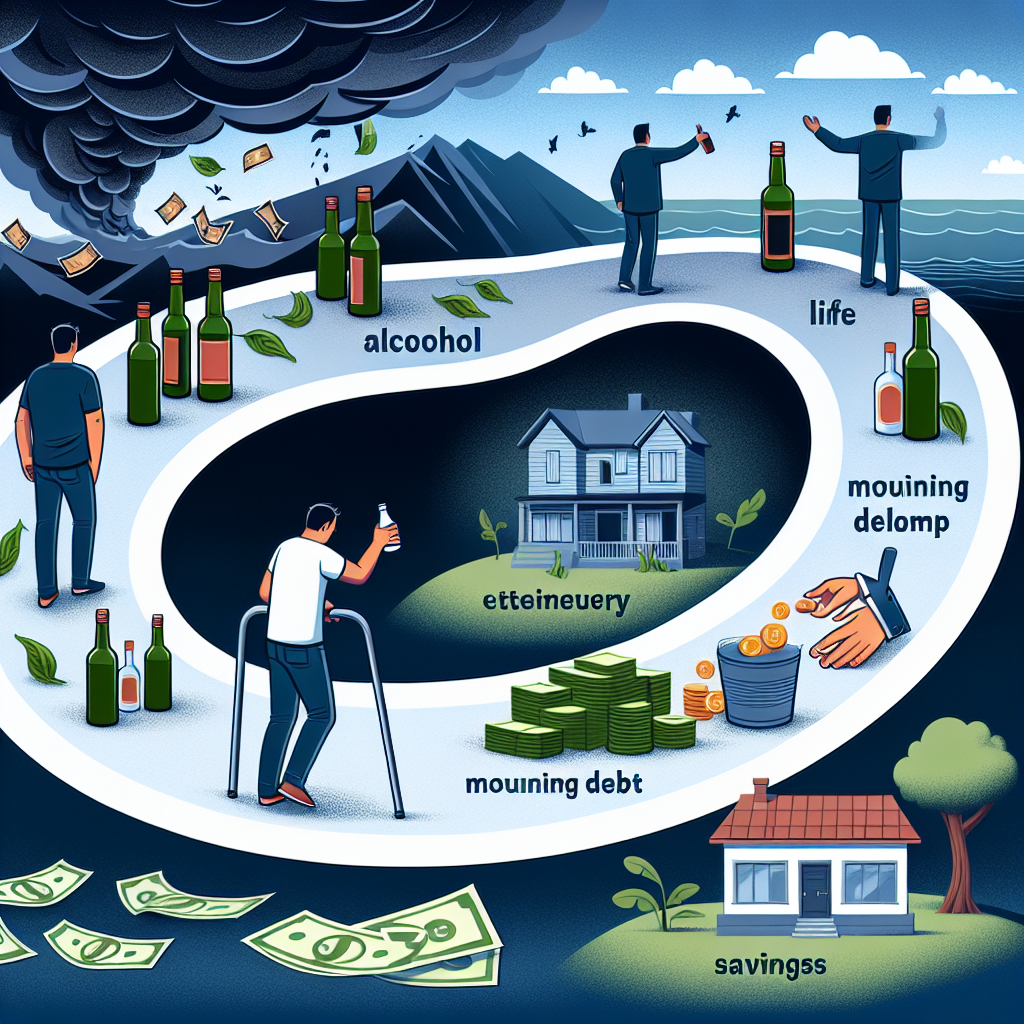-
Table of Contents

“Rebuild, Reclaim, Recover: Your Path to Financial Stability After Alcoholism”
Introduction
Achieving financial recovery after overcoming alcoholism is a multifaceted process that requires dedication, strategic planning, and consistent effort. The journey to financial stability involves addressing the economic consequences of addiction, such as debt accumulation, poor credit scores, and depleted savings. It is essential to create a realistic budget, prioritize debt repayment, and seek professional financial advice if necessary. Additionally, rebuilding one’s career and income streams, possibly through further education or job training, can significantly contribute to financial recovery. Establishing healthy financial habits, such as regular saving and prudent spending, is crucial for long-term stability. By taking these steps, individuals can gradually restore their financial health and work towards a secure and prosperous future.
Steps To Rebuild Your Finances After Overcoming Alcoholism
Achieving financial recovery after overcoming alcoholism is a journey that requires dedication, patience, and strategic planning. The first step in this process is to assess your current financial situation. Begin by taking a comprehensive inventory of your debts, assets, and income. This will provide a clear picture of where you stand financially and help you identify areas that need immediate attention. It is essential to be honest with yourself during this assessment, as it forms the foundation for your financial recovery plan.
Once you have a clear understanding of your financial status, the next step is to create a realistic budget. A well-structured budget will help you manage your expenses and ensure that you are living within your means. Start by listing all your monthly expenses, including rent, utilities, groceries, and any other essential costs. Then, allocate a portion of your income to savings and debt repayment. It is crucial to prioritize your spending and avoid unnecessary expenses that could derail your financial recovery.
In addition to budgeting, it is important to address any outstanding debts. High-interest debts, such as credit card balances, can quickly accumulate and become overwhelming. Consider reaching out to your creditors to negotiate lower interest rates or more manageable payment plans. Additionally, you may want to explore debt consolidation options, which can simplify your payments and potentially reduce the overall interest you pay. By systematically tackling your debts, you can gradually regain control of your financial situation.
Building an emergency fund is another critical step in your financial recovery journey. An emergency fund acts as a financial safety net, providing you with a cushion to fall back on in case of unexpected expenses or income disruptions. Aim to save at least three to six months’ worth of living expenses in a separate, easily accessible account. This fund will not only provide peace of mind but also prevent you from falling back into debt during challenging times.
As you work towards financial stability, it is also important to focus on rebuilding your credit. A good credit score is essential for accessing favorable loan terms, renting an apartment, or even securing certain jobs. Start by obtaining a copy of your credit report and reviewing it for any errors or discrepancies. If you find any inaccuracies, dispute them with the credit bureaus to ensure your report accurately reflects your financial behavior. Additionally, make sure to pay all your bills on time and keep your credit card balances low. Over time, these positive financial habits will help improve your credit score.
While managing your finances, it is equally important to invest in your personal growth and well-being. Overcoming alcoholism is a significant achievement, and maintaining your sobriety should remain a top priority. Consider seeking support from a financial advisor or counselor who specializes in helping individuals in recovery. They can provide valuable guidance and help you stay on track with your financial goals.
Finally, remember that financial recovery is a gradual process, and setbacks are a natural part of the journey. Celebrate your progress, no matter how small, and remain committed to your long-term goals. By staying disciplined, seeking support, and maintaining a positive outlook, you can successfully rebuild your finances and create a stable, fulfilling future.
Budgeting And Saving Strategies For Financial Recovery Post-Alcoholism
Achieving financial recovery after overcoming alcoholism is a journey that requires dedication, strategic planning, and a positive mindset. The path to financial stability can be challenging, but with the right budgeting and saving strategies, it is entirely possible to rebuild your financial health and secure a brighter future. The first step in this process is to assess your current financial situation. This involves taking a detailed inventory of your income, expenses, debts, and assets. By understanding where you stand financially, you can create a realistic budget that aligns with your goals and priorities.
Once you have a clear picture of your finances, it is essential to develop a budget that reflects your new lifestyle. This budget should prioritize essential expenses such as housing, utilities, food, and transportation while also allocating funds for savings and debt repayment. One effective strategy is to adopt the 50/30/20 rule, which suggests allocating 50% of your income to necessities, 30% to discretionary spending, and 20% to savings and debt repayment. This approach can help you maintain a balanced financial life while ensuring that you are making progress toward your long-term goals.
In addition to creating a budget, it is crucial to establish an emergency fund. An emergency fund acts as a financial safety net, providing you with the resources to handle unexpected expenses without resorting to credit cards or loans. Aim to save at least three to six months’ worth of living expenses in a separate, easily accessible account. Building an emergency fund may take time, but consistent contributions, no matter how small, will eventually add up and provide you with peace of mind.
Another important aspect of financial recovery is addressing any outstanding debts. High-interest debts, such as credit card balances, can quickly become overwhelming if not managed properly. Consider using the debt snowball or debt avalanche method to tackle your debts systematically. The debt snowball method involves paying off the smallest debts first, which can provide a sense of accomplishment and motivation to continue. On the other hand, the debt avalanche method focuses on paying off debts with the highest interest rates first, which can save you money in the long run. Choose the method that best suits your personality and financial situation.
As you work on reducing your debts, it is also essential to focus on increasing your income. This can be achieved through various means, such as seeking a higher-paying job, taking on a part-time job or freelance work, or even starting a small business. By diversifying your income streams, you can accelerate your financial recovery and create additional opportunities for saving and investing.
Moreover, it is important to cultivate healthy financial habits that will support your long-term success. This includes tracking your spending, avoiding impulse purchases, and regularly reviewing your budget to ensure it remains aligned with your goals. Additionally, consider seeking the guidance of a financial advisor or counselor who can provide personalized advice and support as you navigate your financial recovery journey.
In conclusion, achieving financial recovery after alcoholism is a multifaceted process that requires careful planning, discipline, and perseverance. By assessing your financial situation, creating a realistic budget, establishing an emergency fund, addressing debts, increasing your income, and cultivating healthy financial habits, you can rebuild your financial health and secure a stable and prosperous future. Remember that every small step you take brings you closer to your goals, and with determination and resilience, you can overcome any financial challenges that come your way.
Q&A
1. **Question:** What are some initial steps to take for financial recovery after overcoming alcoholism?
**Answer:** Initial steps include creating a detailed budget, prioritizing essential expenses, seeking financial counseling, and addressing any outstanding debts through structured repayment plans.
2. **Question:** How can one rebuild credit after financial setbacks due to alcoholism?
**Answer:** Rebuilding credit can be achieved by consistently paying bills on time, reducing outstanding debt, using secured credit cards responsibly, and regularly monitoring credit reports to ensure accuracy and address any discrepancies.
Conclusion
Achieving financial recovery after alcoholism involves several key steps: creating a realistic budget, prioritizing debt repayment, seeking professional financial advice, building an emergency fund, and maintaining sobriety to avoid relapse-related expenses. Additionally, improving financial literacy, seeking employment or career advancement opportunities, and possibly engaging in support groups for accountability can significantly aid in regaining financial stability. Consistent effort and a structured approach are essential for long-term financial health and recovery.



